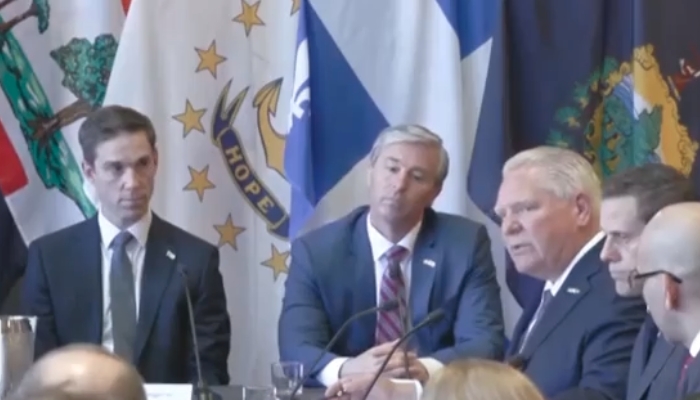The drumbeat of economic nationalism from Donald Trump has sparked an unlikely cross-border alliance. Meeting behind closed doors at the Great Lakes Economic Forum in Cleveland last weekend, Ontario Premier Doug Ford joined Michigan Governor Gretchen Whitmer and Ohio Governor Mike DeWine to form what insiders are calling a “pragmatic coalition” against protectionist trade policies.
“We’re looking at a $400 billion trading relationship that supports millions of jobs on both sides of the border,” said Premier Ford during our interview on the forum’s sidelines. “When tariffs go up, we all lose – American workers, Canadian businesses, everyone.”
The meeting came as Trump promised a sweeping 10-20% tariff on all Canadian imports if elected, specifically targeting auto manufacturing and agricultural products. These sectors form the backbone of the integrated cross-border economy that has developed over decades between Ontario and Great Lakes states.
According to U.S. Department of Commerce data, bilateral trade between Ontario and the eight Great Lakes states reached $391 billion last year, with automotive supply chains so deeply integrated that vehicles cross the border up to seven times during production. The Automotive Parts Manufacturers’ Association estimates that Trump’s proposed tariffs could eliminate 50,000 jobs across the region.
Governor Whitmer, often at political odds with Ford on other issues, found common ground on trade. “The auto industry doesn’t recognize the border the way politicians do,” she said. “A transmission built in Windsor might be installed in a vehicle assembled in Detroit with components from Ohio and Michigan. Disrupting that flow with tariffs isn’t about national security – it’s economic self-harm.”
The unlikely alliance represents more than political expediency. Trade specialists from the Mowat Centre point to the 2018-2019 steel and aluminum tariffs, which cost American consumers an estimated $900 million monthly according to Federal Reserve analysis, while devastating communities on both sides of the border.
“I was in Sault Ste. Marie when the last round of tariffs hit,” I told Ford during our interview. “The same families were hurting whether they lived on the Ontario or Michigan side.”
He nodded grimly. “That’s exactly right. The Great Lakes economy functions as one unit. You can’t hurt one side without hurting the other.”
The forum also revealed splits within Republican ranks. While Trump champions protectionism, Republican governors like DeWine have broken ranks to defend integrated supply chains.
“Ohio exported $21 billion in goods to Canada last year,” DeWine told the gathering. “That’s not just numbers – that’s paychecks for families in Toledo, Cleveland, and Cincinnati. We can’t afford political posturing that threatens those livelihoods.”
The coalition is proposing a joint infrastructure and innovation agenda as an alternative to tariff battles. Their five-point plan includes coordinated border infrastructure investments, harmonized regulations for emerging technologies, joint workforce development, and shared climate adaptation strategies for the Great Lakes watershed.
I witnessed firsthand the unusual diplomatic dance as Democrats and Republicans joined with Progressive Conservatives to navigate the complex politics. Behind the unity messaging, tensions remained visible. When pressed on whether he would publicly challenge Trump’s tariff proposals, Ford carefully sidestepped direct criticism.
“I’m focused on working with whoever is in office to protect Ontario jobs,” he replied. “The relationship between our regions is bigger than any one election.”
Local manufacturing representatives expressed cautious optimism about the coalition but remain deeply concerned. Walking the floor of Amino North America’s auto parts factory in Windsor, plant manager Teresa Piruzza showed me how components cross the border multiple times.
“See this wiring harness? It starts in Michigan, comes here for assembly, goes back for testing, returns for installation. A tariff would hit it four times,” Piruzza explained. “We’d have to completely reconfigure or relocate, and that means job losses.”
The Council of the Great Lakes Region estimates that 107,000 jobs in Ontario and over 300,000 across the Great Lakes states depend directly on cross-border supply chains. Their research suggests these positions typically pay 13-18% above regional wage averages.
Environmental groups have also joined the anti-tariff coalition, albeit for different reasons. The Great Lakes Environmental Alliance points out that economic integration has driven coordinated environmental standards and joint cleanup efforts.
“When the economies separate, environmental cooperation suffers,” said Theresa McClenaghan of the Canadian Environmental Law Association. “We’ve seen this pattern before.”
As Ford, Whitmer, and DeWine left Cleveland, they committed to monthly coordination calls and a formal interstate-provincial compact by September. Whether this unusual alliance can withstand the pressures of an election year remains uncertain.
What is clear is that the integrated Great Lakes economy has created powerful constituencies with a direct interest in maintaining open borders—constituencies that cross political lines and national boundaries in ways that challenge the simple narratives of trade politics.
Standing at the Ambassador Bridge watching trucks stream across, the artificial nature of economic nationalism becomes apparent. The parts, resources, and finished goods flowing across this span don’t recognize the border below—they’re simply moving through what has become, in practice if not in politics, a single economic region.






